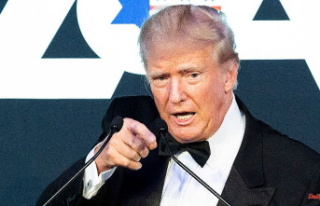For decades, the roles between Americans and Chinese were clearly divided: democracy, baseball and Lady Gaga against dictatorship, poverty and hunger. The fact that at the G20 summit it was a Chinese head of state who advised Europe to become more independent from the United States is symbolic of the change in Chinese-American relations.
Distrust of the Chinese is nothing new in the US. Almost 150 years ago, the United States enacted a law barring Chinese immigrants from entering the Promised Land—at least temporarily. The Chinese Exclusion Act was the political response to an economic crisis in the 1870s, with which the government wanted to ban cheap labor from the Far East and reserve the jobs available for its own citizens. Make America Great Again.
The 21st century is no longer about a few tens of thousands of Chinese workers looking for wages and bread in the USA. China itself now offers enough jobs. The American dream, which describes the path from rags to riches, has been given a Chinese alternative. The People's Republic also offers its citizens the prospect of fabulous wealth.
Rather, it is about the question of which model represented by the two states can credibly convey to the world that it is the better one. And not just to win a beauty contest, but to determine the fortunes of the world in the future. With its economic success over the past 40 years, China has also regained the self-image of imposing its will on the world. And so the liberal-democratic model with the separation of powers and the totalitarian-authoritarian model with the absolute claim to power face each other.
The Chinese recently received the greater number of visitors. Money and growth seem to be more important than freedom for many actors at any price when faced with a choice between rapprochement and distancing from China. For Americans, such considerations in third countries pose an enormous challenge if they are to maintain their role as the number one superpower. It is no longer enough to simply exclude the Chinese, as was the case 150 years ago, in order to solve one's own problems.
Today, if Washington does not use Chinese technology to build its critical infrastructure, national security may benefit. But that does little to help defend American supremacy in the world. Because China has been trying for years to win over US allies on other playing fields. Divide and rule - Beijing is consistently working to sever western alliances. Offensive and confident.
On Tuesday, on the sidelines of the G20 meeting in Bali, China's President Xi Jinping recommended that the Europeans make themselves less dependent on the United States. Speaking to French President Emmanuel Macron, Xi said France and the European Union should "uphold the spirit of independence and autonomy" along with China.
This call is clearly aimed at Americans, and it expresses China's new understanding of itself after decades of poverty and international insignificance. The country doesn't care that the issue of dependency on China is currently being hotly debated in Europe. Also because China has learned that its economic promises to the rest of the world are competitive with America's exports of democracy, baseball and Lady Gaga.
And so China's behavior towards the USA also changes Washington's relations with the Europeans. Because for years they have been visibly impressed by what Beijing has to offer - a huge consumer market with steadily growing per capita income that is far from being full.
"Ideally, what Americans would like to see is that other countries apply their export controls or regulatory tools to China the same way they do," says Evan Feigenbaum, former assistant secretary of state and vice president of the Carnegie Endowment think tank in Washington. Feigenbaum believes the US will seek "voluntary obedience" from both Europeans. If that doesn't succeed, he expects that "the USA will swing the hammer," that is, they would use means to force European partners to adopt a corresponding policy. Such forced obedience would in no way be conducive to the relationship between the USA and Europe.
"If American policies and strategies for strategically competing with China are not reflected elsewhere, then we are heading for a bickering period between the United States and the very partners it needs to compete with China," Feigenbaum said. The People's Republic would be the big beneficiary.












